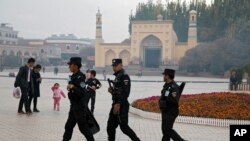China says it has arrested almost 13,000 people it describes as “terrorists” since 2014. It also says it has broken up more than a thousand “terrorist gangs” in the western Xinjiang region.
That information comes from a government report released Monday. The report says the government’s efforts have lessened religious extremism in Xinjiang. But, it gave little evidence of what crimes had been carried out.
Criticism has grown over China’s internment of an estimated 1 million Uyghurs and members of other mostly Muslim ethnic groups living in the Xinjiang Uyghur Autonomous Region.
The Chinese government has described the internment camps as job training centers and, more recently, boarding schools.
But former camp detainees have said they were held in abusive conditions, forced to reject their faith and made to promise their support to China’s ruling Communist Party. Government officials have barred outside investigators trying to independently confirm the former detainees’ reports.
More and more camps have been built across Xinjiang over the past two years. The area also has a huge security presence, with block-by-block police checkpoints and thousands of spy cameras.
The new report says that, along with the arrests of so-called terrorists and terrorist gangs, more than 30,000 people were punished for taking part in “illegal religious activities.”
China’s government has for years tried to suppress pro-independence opinions in Xinjiang. Those opinions grew stronger over the years, as the government moved more and more Han Chinese migrants into the region.
The Uyghur language and culture are closely related to Turkic groups in Central Asia.
Even with its religious, cultural and linguistic differences, China says Xinjiang has been Chinese for thousands of years.
Monday’s report aimed to lessen the influence of Islam in Xinjiang throughout history, saying “Islam is not the natural faith of the Uyghurs and other ethncities, nor is it their only faith.”
Uyghur activists and human rights experts say the camps are part of an aggressive government campaign to destroy the Uyghur identity.
China has aimed to defend itself against charges of cultural genocide. It says its critics want to destroy China’s rise as a world power.
Patrick Poon is a China researcher for Amnesty International. He said the report does not define “terrorism” or “extremism.” He said this, in part, helps the government charge and arrest anyone for any reason.
Maya Wang is a senior China researcher for Human Rights Watch. She said the release of the report shows China is concerned about its international image.
Wang added, “If the Chinese government is so certain that it has nothing to hide in Xinjiang, then it should allow independent international observers, such as the U.N., into the region.”
The Associated Press reported this story. Susan Shand adapted it for Learning English. Ashley Thompson was the editor.
Write to us in the Comments Section or on our Facebook page.
_____________________________________________________________
Words in This Story
internment – adj.to hold against one’s will in a place without options
linguistic– adj.about language
faith – n.a religion or belief
sanctions – n. an action that is taken or an order that is given to force a country to obey international laws by limiting or stopping trade with that country, by not allowing economic aid for that country, etc. — usually plural
allow – v. to permit





